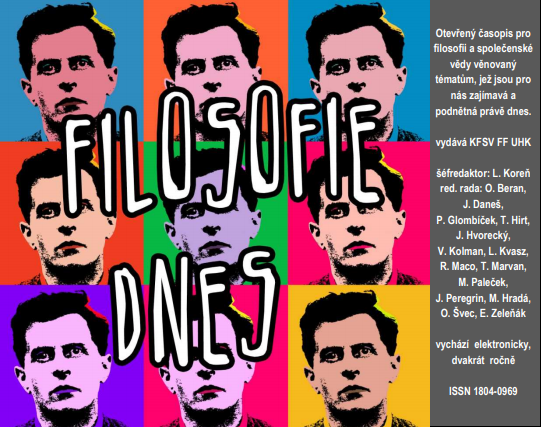Časové vědomí a Husserlova kritika Brentana
DOI:
https://doi.org/10.26806/fd.v8i2.239Keywords:
Husserl, Brentano, Bergmann, Časové vědomí, FenomenologieAbstract
Článek analyzuje původní verzi Husserlovy kritiky Brentanova pojetí časového vědomí, která je obsažena v Husserlových Přednáškách k fenomenologii vnitřního časového vědomí, a Husserlovu snahu vyřešit Brentanův argument nekonečně nekonečného regresu v rukopisném textu O primární modifikaci paměti. Z Husserlovy kritiky si všímá jen dvou bodů. Za prvé kritiky Brentanova prezentismu, tj. názoru, že časové vědomí je založeno v bodu přítomnosti, v němž jsou psychické fenomény, které názor času konstituují, dány současně. Za druhé Husserlovy výtky, že Brentano nepoužívá pro výklad vědomí času schéma počitkový obsah – pojetí počitkového obsahu. Za tímto účelem rekonstruuje text Brentanovu teorii v podobě, v které ji znal Husserl, a vykládá jak Brentanovy důvody pro odmítnutí časové povahy vnitřního vnímání, tak nedořešené problémy Brentanova hlediska. Následně se pokouší dokázat, že Husserl Brentanův prezentismus podcenil a že věcné problémy, které s jeho odmítnutím souvisely, musel řešit zavedením absolutně „kvazi-prezentního“ vědomí a odmítnutím schématu obsah – pojetí pro výklad konstituce imanentních časových jednot. Oba zvolené body Husserlovy kritiky Brentana se tak v pozdějších vrstvách přednášek ukazují jako částečně neoprávněné.
The article discusses the original version of Husserl’s critique of Brentano’s concept of time consciousness, which forms a part of Husserl’s Lectures on the Phenomenology of the Consciousness of Internal Time. Next, it gives an overview of Husserl’s attempt to solve Brentano’s argument from the infinitely infinite regress against the consciousness of internal time. Two points of Husserl’s critique of Brentano are analyzed. The first point concerns Husserl’s critique of Brentano’s presentism. Brentano holds that consciousness of time is contained in the time point of the present now, in which psychical phenomena constituting our time consciousness are given simultaneously. The second point concerns the lack of content – apprehension scheme in Brentano’s explanation of the time consciousness. The article reconstructs Brentano’s position in the form known to Husserl and explains Brentano’s reasons for refusing the internal consciousness of time as well as problems connected with this refusal. An analysis of Husserl’s text proves that Husserl underestimated Brentano’s presentism and that he was forced to introduce a concept of the absolute time consciousness to solve the problems connected with his refusal of Brentano’s position. Since Husserl had to eventually give up the content – apprehension scheme in his explanation of immanent time unities, his original critique of Brentano is shown to be partly unjustified.
Downloads
Published
Issue
Section
License
Authors who publish in this journal agree that:
1. Authors retain copyright and guarantee the journal the right of first publishing. All published articles are licensed under the Creative Commons Attribution license, which allows others to share this work under condition that its author and first publishing in this journal was acknowledged.
2. Authors may enter into other agreements for non-exclusive dissemination of work in the version in which it was published in the journal (for example, publishing it in a book), but they have to acknowledge its first publication in this journal.
3. Authors are allowed and encouraged to make their work available online (for example, on their websites) as such a practice may lead to productive exchanges of views as well as earlier and higher citations of published work (See The effect of open access).


